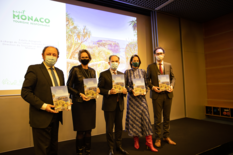- Homepage
- A la Une du Portail
- Tourist and Convention Authority presents White Paper on Responsible Tourism in Monaco
Tourist and Convention Authority presents White Paper on Responsible Tourism in Monaco
The White Paper on Responsible Tourism in Monaco was officially presented on Monday 29 November, in the presence of Jean Castellini, Minister of Finance and Economy, Caroline Rougaignon, President of the Economic, Social and Environmental Council, Annabelle Jaeger-Seydoux, Director of the Mission for Energy Transition, Patrick Rolland, Deputy Director of the Department of Environment, and partners and stakeholders from the tourism sector.
The outcome of a project begun in 2020, this tool should enable the tourism sector, which has been hard hit by the health crisis, to become more conscious of its responsibilities and the need to challenge some models. The document draws on analyses of surveys, comparative studies and discussion workshops. It aims to offer a better understanding of tourism in Monaco and identify its strengths and weaknesses to help prepare for the tourism of tomorrow and make it even more sustainable, using the United Nations Sustainable Development Goals (UN SDGs) and the Principality’s energy transition targets as a basis. This collegial piece of work was carried out by the Tourist and Convention Authority and François Tourisme Consultants, together with all of the destination’s partners, assistance from the Mission for Energy Transition and the support of the Department of the Environment.
With a preface by H.S.H. Prince Albert II of Monaco and Mr Zurab Pololikashvili, Secretary-General of the World Tourism Organization, the White Paper serves as a foundation which can be used to highlight areas for improvement and actions to take. These will be further developed very soon in the responsible tourism strategy, which will continue to be aligned with the UN SDGs and the Principality’s energy transition targets.
Destination Monaco and its partners are already putting in place solutions to ensure optimal management of resources. These are taking shape through the strong choice of a binding environmental certification that has been adopted by a majority of hotels, and genuine commitments to promote soft mobility, recycling and efforts to reduce food waste.
Autres actualités du thème

E-scooters and e-bikes: harmonised regulations to better protect young users









